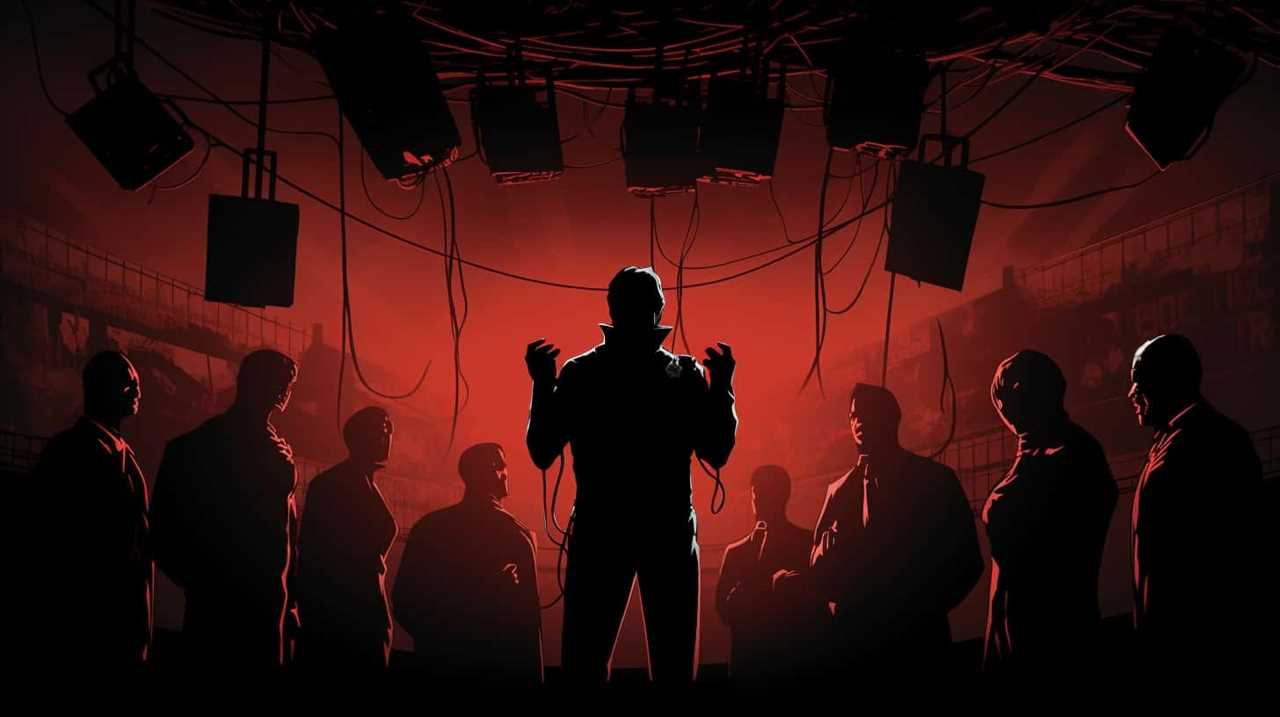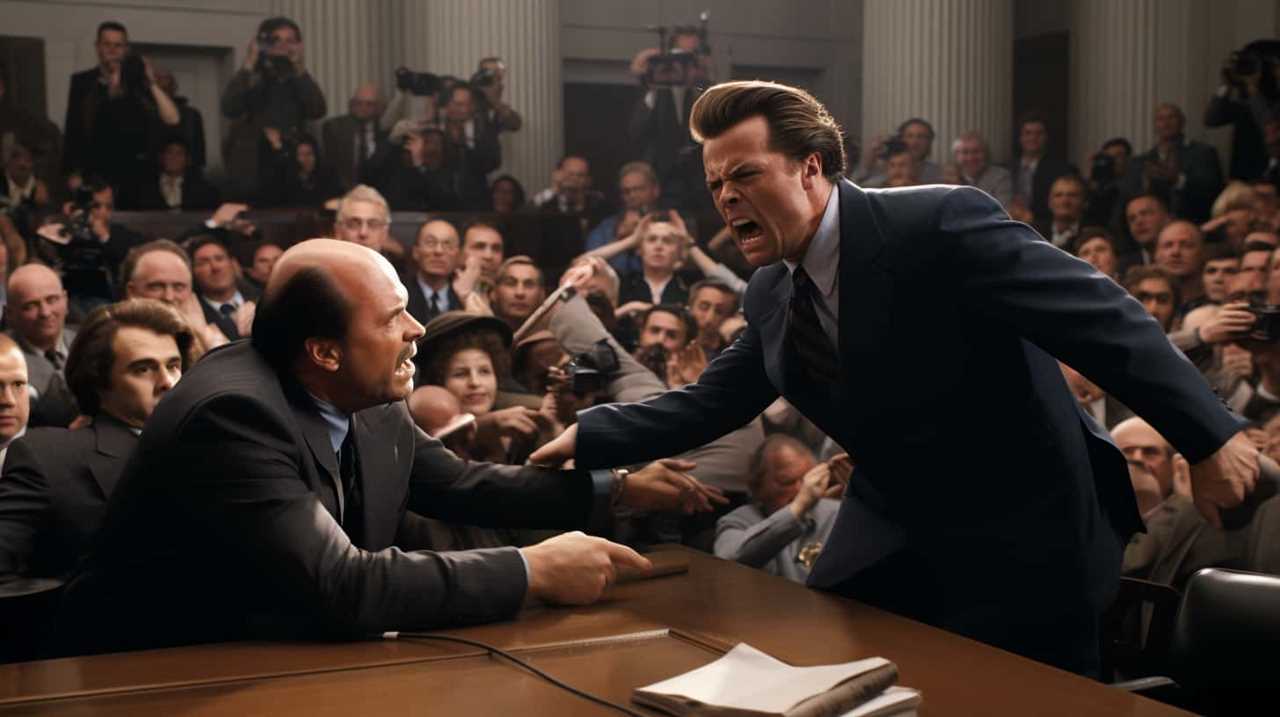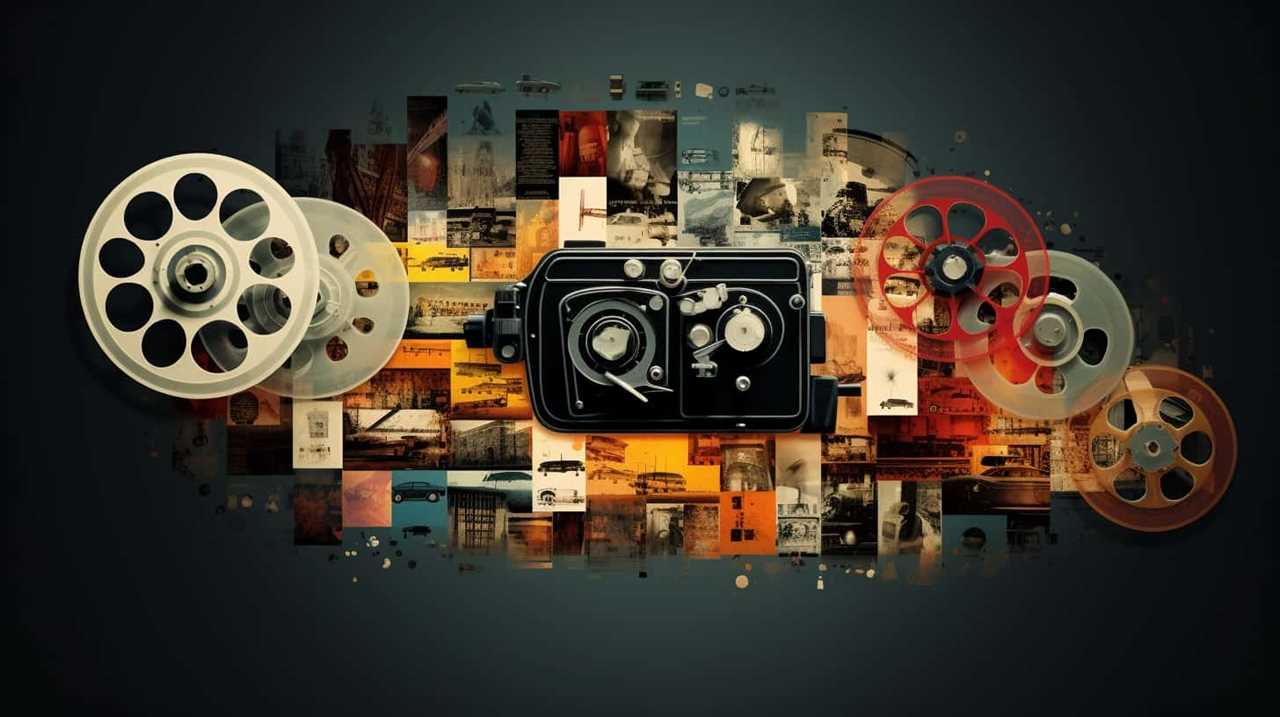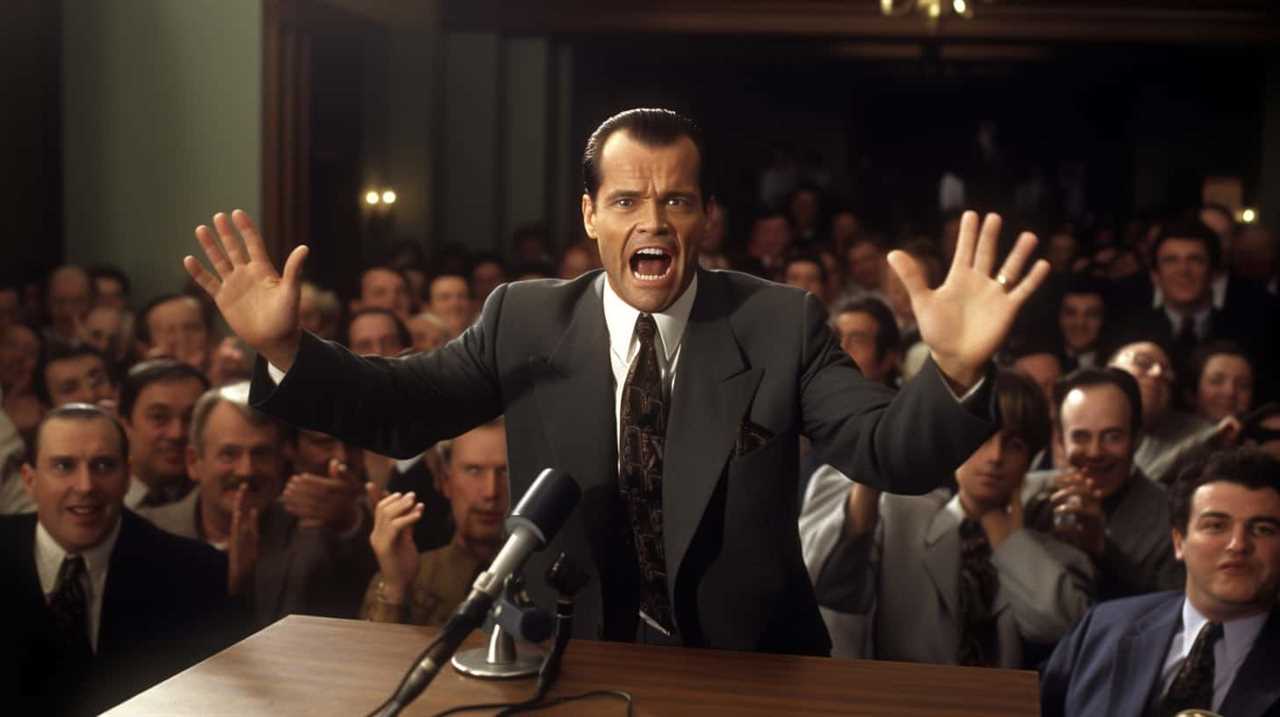The saying ‘life imitates art’ is best exemplified in the realm of cinema. As I explore existentialism through film dialogues, I urge you to embark on a profound journey of philosophical inquiry and self-discovery.
Through the lens of classic and contemporary films, we will embark on a thought-provoking journey that challenges our perceptions of reality, existence, and the meaning of life itself. From questioning the nature of free will and determinism to exploring the absurdity of our existence, we will navigate the complex landscapes of existential angst and examine the profound impact of existentialism on film philosophy.
So, join me as we unlock the secrets hidden within the captivating dialogue of cinema, and uncover the profound insights that lie beneath the surface of our favorite films.
Key Takeaways
- Classic films use various techniques and storytelling devices to delve into existential themes and illustrate the existential crisis faced by individuals.
- Dialogue plays a crucial role in shaping the meaning of a film, conveying deeper symbolism, and exploring existential themes.
- Cinema challenges our perception of reality, raises profound existential questions, and blurs the line between fantasy and reality.
- Movies explore the philosophical questions of free will and determinism, examining the extent of human agency and the influence of external forces.
Existential Themes in Classic Films
In my exploration of existentialism through film dialogue, I find that classic films often delve into existential themes using a range of techniques and storytelling devices. These films provide a platform for examining the human condition and exploring the search for purpose in life. One recurring theme is the existential crisis, which is evident in many modern films as well. Directors use characters’ internal struggles and external conflicts to illustrate the anguish and uncertainty that individuals face when confronted with the meaninglessness of existence. Through thought-provoking dialogue and thoughtfully crafted narratives, these films challenge viewers to question their own purpose and the significance of their actions.

Classic films employ various techniques to explore existential themes. They often emphasize the individual’s isolation and alienation from society, highlighting the struggle to find meaning in a seemingly indifferent world. Additionally, these films often tackle philosophical questions about identity, freedom, and the nature of reality. By incorporating existential themes into their stories, filmmakers encourage audiences to reflect on their own lives and contemplate the deeper meaning behind their experiences.
Transitioning into the subsequent section about ‘the search for meaning in film dialogue’, it’s important to recognize that dialogue plays a crucial role in conveying existential themes in classic films. Through carefully crafted conversations, characters engage in philosophical debates, introspection, and self-reflection, allowing viewers to witness their inner struggles and existential dilemmas. By examining the search for meaning in film dialogue, we can gain further insight into the ways in which classic films explore existentialism and its impact on our understanding of the human condition.
The Search for Meaning in Film Dialogue
Dialogue plays a crucial role in shaping the meaning of a film, as it allows characters to express their thoughts, beliefs, and emotions. Through well-crafted dialogue, filmmakers can convey deeper symbolism and explore existential themes.
Dialogue’s Role in Meaning
Through the exploration of film dialogue, I uncover the profound role it plays in the search for meaning. Language is a powerful tool that allows us to communicate and understand the world around us.

In film, dialogue serves as a vehicle for exploring existentialism through visual storytelling. It’s through the words spoken by characters that we gain insight into their thoughts, beliefs, and struggles. The power of language lies in its ability to convey complex emotions and ideas, creating a connection between the audience and the characters on screen.
Symbolism in Film Dialogue
Exploring the symbolism embedded in film dialogue unveils the hidden layers of meaning and invites introspection into the search for purpose and significance. Symbolism in film dialogue serves as a powerful tool to convey deeper messages and explore the nature of existence through film language.
Through the clever use of metaphors, allegories, and motifs, filmmakers are able to communicate complex ideas and evoke profound emotions. Symbolism in film dialogue allows for a more nuanced understanding of the human experience, as it delves into the subconscious and explores the universal themes of life, death, love, and identity.
Questioning Reality and Existence in Cinema
How can cinema challenge our perception of reality and make us question our own existence? Cinema has the power to explore perception and reality in unique and thought-provoking ways. Through film dialogue, characters can raise profound existential questions that force us to reflect on our own existence. By presenting alternate realities, blurring the line between fantasy and reality, and engaging us in philosophical debates, cinema pushes the boundaries of our understanding and challenges our preconceived notions of what is real.

To illustrate this, consider the following table:
| Film Dialogue | Existential Questions Raised |
|---|---|
| "The Matrix" (1999) | What is the nature of reality? Can we trust our senses? |
| "Eternal Sunshine of the Spotless Mind" (2004) | What defines our identity? Can memories shape our reality? |
| "Inception" (2010) | How do we differentiate dreams from reality? |
| "Blade Runner" (1982) | What does it mean to be human? Can machines have a soul? |
These films challenge our perception of reality and invite us to question our own existence. They explore the complexities of human consciousness, the nature of identity, and the limits of our understanding. By presenting these themes through engaging dialogue, cinema opens up a space for us to contemplate our own existence and the world around us.
As we delve into the examination of free will and determinism in movies, we continue to explore the profound philosophical questions raised by cinema and how they push the boundaries of our understanding of ourselves and the world we inhabit.
Examining Free Will and Determinism in Movies
I thoroughly examine the exploration of free will and determinism in movies. The concept of free will versus determinism has long been a topic of philosophical debate, and modern cinema has embraced this theme in thought-provoking ways. Through the exploration of existentialism in film dialogue, directors have delved into the complexities of human agency and the constraints of fate.

One notable aspect of free will versus determinism in modern cinema is the emphasis on choice and its consequences. Films often present characters who are faced with difficult decisions, highlighting the weight of their actions and the impact they’ve on their own lives and the lives of others. Whether it’s a character grappling with the decision to commit a crime or to follow their dreams, these choices serve as a reflection of the individual’s agency and the potential consequences that come with it.
Foreign films, in particular, have excelled in exploring existentialism through dialogue. The use of foreign languages and cultures adds an additional layer of complexity to the examination of free will and determinism. By incorporating different perspectives and worldviews, these films challenge our preconceived notions and invite us to question the nature of choice and destiny.
Navigating the Absurdity of Life Through Film Scripts
When analyzing the cinematic interpretations of absurdity, one can’t ignore the profound existential themes that permeate through film scripts. Through the lens of existentialism, filmmakers explore the inherent absurdity of life and the human condition.
Films like ‘Eternal Sunshine of the Spotless Mind’ and ‘Being John Malkovich’ challenge our perception of reality, inviting us to reflect on the absurdity of existence and the meaning we assign to it.

Cinematic Interpretations of Absurdity
While exploring existentialism through film dialogue, one can navigate the absurdity of life through cinematic interpretations of absurdity found in film scripts.
Cinematic exploration of absurdist narratives offers a unique lens through which we can examine the chaotic and nonsensical nature of existence. These films often present characters grappling with the meaninglessness of their actions, the futility of their pursuits, and the arbitrary nature of their circumstances.
Through clever dialogue and thought-provoking scenes, filmmakers challenge our conventional understanding of reality and provoke us to question the absurdity of our own lives. By immersing ourselves in these cinematic interpretations, we’re confronted with the unsettling realization that the world can be a bewildering and irrational place.
As we delve further into the realm of film, we uncover deeper existential themes that shed light on the human condition and our search for meaning in an absurd world.

Existential Themes in Film
Navigating the absurdity of life through film scripts, existential themes in film shed light on the human condition and provoke thought.
In modern cinema, filmmakers have embraced the exploration of existentialism, pushing the boundaries of storytelling and challenging traditional narratives. Foreign films, in particular, have emerged as a powerful medium for expressing existential themes.
These films provide unique perspectives on the human experience, often exploring the complexities of identity, meaning, and existence. Through their distinct cultural lens, foreign filmmakers offer a fresh and innovative approach to existentialism, inviting audiences to question their own perceptions and beliefs.
Exploring the Individual’s Struggle for Identity in Cinema
The journey of self-discovery in cinema reveals the profound struggle individuals face in defining their own identities. Through the struggles of self-discovery, characters in films often find themselves grappling with an existential crisis, questioning their place in the world and the meaning of their existence. This theme is a recurring motif in cinema, as filmmakers explore the complexities of the human experience and the search for identity.

| Film Title | Character | Struggles of Self-Discovery |
|---|---|---|
| "Lost in Translation" | Charlotte | Feeling disconnected and lost in a foreign culture, Charlotte embarks on a journey of self-discovery, questioning her purpose and searching for meaning in her life. |
| "Fight Club" | Narrator | The Narrator struggles with his own identity, feeling trapped in a monotonous existence. Through his alter ego, Tyler Durden, he explores his darker desires and attempts to break free from societal constraints. |
| "Eternal Sunshine of the Spotless Mind" | Joel | Joel undergoes a process of self-discovery as he grapples with the erasure of memories from a failed relationship. Through this journey, he learns to confront his own fears and embrace the complexities of love and loss. |
As the characters in these films navigate their own paths of self-discovery, they force us to question our own identities and the choices we make. Their struggles become a mirror through which we can examine our own lives, prompting us to reflect on our own existential crises and search for meaning. The exploration of the individual’s struggle for identity in cinema serves as a catalyst for introspection, challenging us to confront our own fears and uncertainties about who we are and what our purpose may be.
Reflections on Mortality and the Human Condition in Film
In cinema, death and the intricacies of human existence are often contemplated and explored. Film has the unique ability to capture the essence of life and confront us with our own mortality. Through the lens of existentialist themes in animation and the exploration of death in film dialogue, we’re presented with profound reflections on the human condition.
Here are four key insights that emerge from this exploration:
- The inevitability of death: Films often remind us that death is an inescapable reality. Whether through the sudden loss of a loved one or the gradual decay of our own bodies, death serves as a stark reminder of our finite existence.
- The search for meaning: Many films delve into the existential dilemma of finding purpose in life. The contemplation of death prompts characters to question the meaning of their existence and the legacy they’ll leave behind.
- The fear of mortality: Death can evoke a deep sense of fear and existential angst. Films often explore the profound impact that the awareness of our own mortality can have on our choices, relationships, and outlook on life.
- The transformative power of death: In some films, death serves as a catalyst for personal growth and self-discovery. Characters are forced to confront their mortality, leading to profound introspection and a reevaluation of their priorities.
Through these thematic explorations, film allows us to confront our own mortality and invites us to reflect on the deeper questions of existence. It’s through this exploration of death in film dialogue that we gain a deeper understanding of the human condition and our place in the world.

Confronting Existential Crises in Memorable Movie Quotes
When it comes to exploring existentialism through film, memorable movie quotes play a crucial role in highlighting the themes and ideas surrounding existential crises.
These quotes not only capture the essence of the human condition but also serve as powerful reminders of the impact these crises can have on our lives.
Film Quotes Highlighting Existentialism
I have discovered that certain film quotes powerfully capture the essence of existentialism, confronting the existential crises we face in memorable and thought-provoking ways. Here are four film quotes that highlight existentialism in modern cinema and showcase the struggles of existentialist characters:
- ‘I think therefore I am.’ This famous quote from Descartes in the movie ‘Waking Life’ reflects the existentialist belief that our existence is defined by our thoughts and consciousness.
- ‘What is the point of it all?’ In ‘The Matrix’, Neo’s existential crisis questions the meaning of his existence and the reality he perceives, reflecting the existentialist search for purpose and truth.
- ‘We are all just stories in the end.’ This line from ‘Doctor Who’ reminds us that our existence is fleeting and ultimately insignificant, echoing the existentialist idea of the absurdity and transience of life.
- ‘I don’t want to be a product of my environment. I want my environment to be a product of me.’ In ‘The Departed’, Frank Costello’s statement highlights the existentialist theme of individual freedom and the desire to shape one’s own destiny.
These film quotes serve as windows into the existentialist experience, provoking introspection and inviting us to question the nature of our own existence.
![]()
Impact of Existential Crises
Existential crises profoundly shape our understanding of the human condition, as evidenced in the poignant movie quotes that confront these crises head-on.
In modern society, existential crises have become increasingly prevalent, as individuals grapple with the overwhelming sense of meaninglessness and the fear of their own mortality. This existential angst is reflected in movies, where characters struggle to find purpose and navigate the complexities of existence.
These films often offer coping mechanisms for existential crises, providing viewers with a glimpse into the human experience and offering potential avenues for self-reflection and growth.
Through thought-provoking dialogue, movies such as ‘Fight Club’ and ‘Eternal Sunshine of the Spotless Mind’ question the nature of reality, the role of personal identity, and the search for authentic connection.

Memorable Movie Dialogues
Confronting existential crises in memorable movie quotes reveals the profound impact of these dialogues on our understanding of the human condition. In the realm of existentialism in modern cinema, the influence of existential philosophy can be seen in these thought-provoking lines. Here are four examples of memorable movie dialogues that confront existential crises and leave a lasting impression:
- ‘I’m as mad as hell, and I’m not going to take this anymore!’ – Network (1976)
This quote captures the frustration and disillusionment with the modern world, highlighting the existential struggle against societal norms and the desire for authenticity. - ‘I hope that when the world comes to an end, I can breathe a sigh of relief, because there will be so much to look forward to.’ – Melancholia (2011)
This quote reflects the existential dread and the search for meaning in the face of impending doom, questioning our place in the universe. - ‘I’m stuck in this infinite loop of my own insignificance.’ – The Truman Show (1998)
This line encapsulates the existential crisis of Truman, who discovers that his entire life has been a carefully constructed illusion, raising questions about identity and free will. - ‘The greatest thing you’ll ever learn is just to love and be loved in return.’ – Moulin Rouge! (2001)
This quote emphasizes the existential need for human connection and the pursuit of love as a source of meaning in life.
These memorable movie dialogues serve as windows into the human experience, challenging us to confront our own existential dilemmas and prompting us to ponder the deeper meaning of our existence.
The Portrayal of Existential Angst in Film Dialogue
Through the lens of film dialogue, my exploration of existentialism delves into the portrayal of profound anguish. Existentialism and cinematic storytelling share a profound connection, as the influence of existential philosophy on film dialogue can be seen in the depiction of characters grappling with existential angst. Existentialism, with its emphasis on the individual’s search for meaning in an absurd and indifferent world, provides a rich source of inspiration for filmmakers to explore themes of existential angst and despair.
In cinema, existential angst is often depicted through thought-provoking dialogues that capture the inner turmoil and existential crisis of the characters. These dialogues explore the fundamental questions of existence, such as the meaning of life, the nature of reality, and the inevitability of death. They evoke a sense of unease and restlessness, as characters confront the absurdity and futility of their existence.

Films like ‘Blade Runner,’ ‘The Seventh Seal,’ and ‘Fight Club’ exemplify the portrayal of existential angst in film dialogue. They delve into the existential dilemmas faced by their characters, challenging the audience to contemplate the purpose of their own existence.
The portrayal of existential angst in film dialogue not only adds depth and complexity to the storytelling but also provides a platform for audiences to reflect on their own existential concerns. It serves as a catalyst for introspection and philosophical contemplation, inviting viewers to confront their own existential anxieties and question the meaning of their lives.
As we transition into the subsequent section about existentialist perspectives on love and relationships in cinema, it’s important to note that existential angst isn’t limited to individual existence. It also manifests in love and relationships, as characters grapple with the inherent uncertainties and insecurities that come with human connection.
Existentialist Perspectives on Love and Relationships in Cinema
Continuing our exploration of existentialism in film dialogue, I delve into the existentialist perspectives on love and relationships in cinema. In this realm, filmmakers often use the medium to depict the complexities of human connections and the profound impact they’ve on our search for purpose and self-discovery.

Here are four key aspects of existentialist perspectives on love and relationships in cinema:
- Authenticity: Existentialist films often emphasize the importance of genuine and authentic connections. Characters strive to find partners who accept them for who they truly are, encouraging personal growth and self-acceptance.
- Freedom and Choice: Existentialism emphasizes the freedom to choose and the responsibility that comes with it. In cinema, this is reflected in characters who actively pursue relationships and make deliberate choices, even in the face of uncertainty and existential angst.
- Alienation and Loneliness: Existentialist films often explore the inherent loneliness of human existence. Characters may struggle with feelings of isolation, longing for meaningful connections, and grappling with their own mortality.
- The Exploration of Meaning: Love and relationships in existentialist cinema serve as vehicles for exploring the meaning of life. Characters may search for purpose, question societal norms, and confront existential dilemmas through their interactions with others.
As we delve deeper into examining existential themes in contemporary films, we’ll uncover how filmmakers continue to explore these perspectives and challenge conventional notions of love and relationships.
Examining Existential Themes in Contemporary Films
In my exploration of existentialism through film dialogue, I’m intrigued by the prevalence of existential themes in contemporary films. One particular genre that stands out in this regard is science fiction. Sci-fi movies often delve into existentialist themes, exploring the nature of existence, the meaning of life, and the consequences of our choices.
In many sci-fi films, we witness characters grappling with questions of identity and purpose. Films like ‘Blade Runner’ and ‘The Matrix’ present us with protagonists who question their own reality and struggle to find meaning in a world dominated by technology. These movies challenge us to reflect on our own existence and the choices we make in shaping our lives.

Moreover, exploring the role of choice in existential cinema is another fascinating aspect. In films like ‘Arrival’ and ‘Interstellar,’ we see characters faced with difficult decisions that have far-reaching consequences. These films emphasize the weight of our choices and their impact on our lives and the lives of others. By examining the role of choice, existentialist themes in contemporary sci-fi movies encourage us to reflect on the responsibility we have in shaping our own destinies.
The Impact of Existentialism on Film Philosophy
Existentialism has had a profound impact on the philosophy of film. The exploration of existential themes and ideas has greatly influenced film theory and the way movies are made and interpreted. Here are four ways in which existentialism has shaped film philosophy:
- Existentialism and Film Theory:
Existentialist ideas, such as the questioning of existence, freedom, and individuality, have become central to film theory. Filmmakers and theorists have used existential concepts to analyze the human condition and explore deeper aspects of the human experience. - The Influence of Existentialist Directors:
Existentialist directors, such as Ingmar Bergman and Andrei Tarkovsky, have had a significant impact on cinema. Their films often delve into existential themes, presenting characters grappling with the meaning of life, the nature of reality, and their own existence. - The Use of Existential Techniques:
Filmmakers have adopted existential techniques, such as non-linear narratives and ambiguous endings, to create a sense of uncertainty and provoke philosophical contemplation. These techniques allow viewers to engage with existential questions and reflect on their own existence. - Existentialism as a Filmmaking Philosophy:
Existentialism hasn’t only influenced the content of films but also the approach to filmmaking itself. Many filmmakers embrace the existentialist philosophy, emphasizing the subjective experience, authenticity, and the exploration of existential themes in their works.
Frequently Asked Questions
How Does the Portrayal of Existential Angst in Film Dialogue Differ in Classic Films Compared to Contemporary Films?
In comparing the portrayal of existential angst in film dialogue, it is intriguing to analyze the differences between classic and contemporary films. The evolution of existential themes in film dialogue from the past to the present is a fascinating subject to explore.
How Do Movies Explore the Individual’s Struggle for Identity and Its Connection to Existentialism?
Movies, through their portrayal of the individual’s struggle for identity, delve into the depths of existentialism. They provide a lens to examine the complexities of self-discovery in coming-of-age films and explore the role of existentialism in the portrayal of mental health.

Can You Provide Examples of Memorable Movie Quotes That Confront Existential Crises?
Analyzing memorable movie quotes that confront existential crises reveals the portrayal of existentialism in film. Classic films often present profound and introspective dialogue, while contemporary films explore existential themes through more relatable and modern language.
How Has the Impact of Existentialism on Film Philosophy Evolved Over Time?
The evolution of existentialism has greatly impacted film philosophy, shaping the way we explore the human condition on screen. From the intense introspection of early works to the nuanced portrayal of existential crises today, the influence of existentialism continues to push the boundaries of storytelling.
Are There Any Specific Existentialist Perspectives on Love and Relationships That Are Commonly Depicted in Cinema?
In cinema, existentialist perspectives on love and relationships explore the meaning of connection and the fear of loneliness. They examine the struggle between individuality and societal expectations, shedding light on the complexities of human connection.
Conclusion
In exploring existentialism through film dialogue, we’ve delved into the depths of human existence, questioning reality, free will, and the absurdity of life itself.

We’ve witnessed the portrayal of existential angst and examined the perspectives on love and relationships in cinema. From classic films to contemporary ones, the impact of existentialism on film philosophy is undeniable.
So, as we ponder the existential themes in these movies, we must ask ourselves: Do these stories hold a mirror up to our own lives and provoke us to question our own existence?








